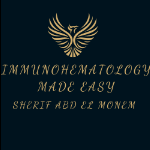Reputation Activity
-
 Sherif Abd El Monem got a reaction from Bet'naSBB in What’s this irradiation label on this bag?!!!(This conversation is happening in the blood bank, next to the blood component fridge. 'T' is closely inspecting an RBCs bag.)
Sherif Abd El Monem got a reaction from Bet'naSBB in What’s this irradiation label on this bag?!!!(This conversation is happening in the blood bank, next to the blood component fridge. 'T' is closely inspecting an RBCs bag.)
Characters:
'S': Someone who has been working in the blood bank for a while. 'T': Someone who just started working in the blood bank. T: Hey, 'S', I keep seeing these bags with the "IRRADIATED" sticker on them. I understand that something was done to the bag, but why do only certain bags need this? And what exactly does it mean for the blood?
S: Excellent question, 'T'! This is a very important safety step that we perform for specific patients. Let’s break it down step by step.
Blood irradiation simply means exposing cellular blood components—such as RBCs, Platelets, and Granulocytes—to a controlled and calculated dose of radiation, usually using gamma rays or X-rays.
T: Radiation? That sounds serious! Why do we do this?
S: Exactly! Don’t just do things blindly—try to understand the reason behind them!
This irradiation is an additional step we apply to blood components for a very important reason. What is it?
It’s to prevent something called:
Transfusion-Associated Graft-versus-Host Disease (TA-GVHD).
T: Graft-versus-Host… like what happens in transplants? Can that happen from just a regular blood transfusion?
S: Yes, exactly the same concept! Though thankfully, it’s quite rare. Blood components contain immune cells from the donor, specifically T lymphocytes.
In TA-GVHD, these donor T cells recognize the patient’s body as foreign and start attacking it. Normally, the patient’s immune system can handle these donor cells, but problems arise when:
The patient’s immune system is very weak and unable to fight back (due to certain diseases or treatments). The patient is on immunosuppressive drugs. The donor is a relative of the patient or the bag is HLA-matched. In this case, the patient’s body may not recognize the donor’s cells as foreign, allowing them to survive and proliferate, but at the same time, these donor cells attack the patient’s body. T: Got it, that makes sense. So, irradiation stops these T cells from attacking?
S: Exactly! Radiation damages the DNA of the T cells, preventing them from multiplying or launching an attack. This effectively neutralizes the risk of TA-GVHD.
T: So, who exactly needs irradiated blood?
S: Patients with weakened immune systems, as we just discussed. The key groups include:
Patients receiving intrauterine transfusions (before birth). Premature infants or low-birthweight newborns. Patients with congenital immunodeficiencies. Those undergoing stem cell or bone marrow transplants. Patients with certain cancers or those on strong immunosuppressive drugs (e.g., Fludarabine). Patients receiving granulocyte transfusions. Anyone receiving blood from a relative or an HLA-matched donor. T: Understood. So how is irradiation done in practice?
S: We place the blood bag in a specialized device called a blood irradiator, which delivers a precise dose:
U.S. standards: At least 25 Gy at the center of the bag and 15 Gy at any other part. European standards: Minimum of 25 Gy anywhere in the bag, but the allowed range can go up to 50 Gy. This dose destroys the T cells.
We also use indicator labels that change color to confirm the bag has been irradiated, and the machines are regularly checked to ensure they deliver the exact required dose.
T: Does irradiation affect the blood itself? Like its quality or how long we can store it (shelf life)?
S: Good point! Yes, it does have some effects, especially on Red Blood Cells (RBCs).
Irradiation causes slight damage to the RBC membrane, leading to increased potassium leakage and some cell breakdown during storage. Because of this, the shelf life of the blood bag may change. This is why we follow strict guidelines, typically based on:
American (AABB) guidelines. European guidelines. But most importantly, the policy of your specific institution. Shelf Life Rules for RBCs:
American Standards: Irradiation can be done at any time before the bag’s original expiration date. The new expiration date becomes: 28 days from the irradiation date OR the original expiration date, whichever comes first. Example:
An RBC bag has an original shelf life of 42 days. If irradiated on Day 10, the new expiration date will be Day 38 (10 + 28) since that’s earlier than Day 42. If irradiated on Day 20, adding 28 days would bring it to Day 48, which exceeds the original Day 42 expiration, so the bag will still expire on Day 42. European Standards: Irradiation must be done within the first 28 days from donation (older bags cannot be irradiated). The new expiration date becomes: 14 days from irradiation OR 28 days from donation, whichever comes first. Example:
If a bag is irradiated on Day 10, it will expire on Day 24 (10 + 14) since that’s earlier than Day 28 from donation. If irradiated on Day 20, adding 14 days brings it to Day 34, but since that’s past Day 28, the bag still expires on Day 28. T: Wow, that’s really precise! So the expiration date must be carefully checked after irradiation.
S: Absolutely! Ideally, we try to irradiate RBCs as close to transfusion as possible.
If an irradiated RBC bag isn’t transfused within ~24 hours, it’s often recommended to wash the bag before giving it to the patient. This is mainly to remove excess potassium that may have leaked.
T: What about platelets? Does their shelf life decrease too?
S: Luckily, no. Platelets tolerate irradiation much better.
They can be irradiated at any point within their shelf life and still keep their original expiration date.
T: One last question?
S: Ask away, my friend!
T: Doesn’t leukoreduction also prevent GVHD?
S: That’s a common question! Leukoreduction significantly reduces the number of white blood cells, but it doesn’t eliminate them completely. Some T cells may still remain in amounts that can cause TA-GVHD in high-risk patients.
That’s why leukoreduction is NOT considered a replacement for irradiation when the goal is to prevent TA-GVHD.
However, some newer pathogen inactivation technologies treat blood components to reduce infection risks, and these methods also disable T lymphocytes.
So, blood components that undergo pathogen reduction often don’t require irradiation to prevent TA-GVHD.
T: This is super useful, 'S'! Now that I understand why we irradiate blood and how it affects storage, everything is much clearer. It’s clearly a critical step for patient safety.
S: Exactly! It’s all about protecting patients with weakened immune systems.
And always keep asking questions, 'T'—that’s the best way to learn in the blood bank!
What’s this irradiation label on this bag?!!!
-
 Sherif Abd El Monem got a reaction from Malcolm Needs in Options for Pre transfusion Testing – Where Does Tube Testing Fit(Webinar)- Susan T. Johnson🔬 Pre-Transfusion Testing: Is Tube Testing Still Relevant? 🩸
Sherif Abd El Monem got a reaction from Malcolm Needs in Options for Pre transfusion Testing – Where Does Tube Testing Fit(Webinar)- Susan T. Johnson🔬 Pre-Transfusion Testing: Is Tube Testing Still Relevant? 🩸
In a world of automation, is there still a place for test tube methods in transfusion medicine? The answer is YES! Here’s why:
🔹 Resolving ABO Discrepancies – When automated methods flag uncertain results, tube testing helps confirm patient blood type.
🔹 Detecting Weak D and Partial D Phenotypes – Some Rh discrepancies can only be resolved using test tubes or additional reagents.
🔹 Uncovering IgM Antibodies – Many automated platforms focus on IgG, but tube testing catches clinically relevant IgM antibodies.
🔹 Handling Urgent Transfusions – When time is critical, tube testing can provide faster results than automated methods.
🔹 Troubleshooting Complex Cases – From mixed-field reactions to multiple antibodies, tube testing remains a trusted problem-solving tool.
⚠️ Takeaway: While automation enhances efficiency, test tube methods are still vital for accurate pre-transfusion testing and patient safety!
🎥 Watch the full webinar by Sue Johnson.
📄 Get access to:
✅ Webinar Transcript
✅ Bullet-Point Summary of Key Takeaways
✅ Q&A Session from the Webinar
✅ Study Based on the Webinar Transcript
💬 What’s your lab’s approach? Do you still use tube testing? Share your thoughts! 👇
Options for Pre transfusion Testing – Where Does Tube Testing Fit(Webinar)- Susan T. Johnson
-
 Sherif Abd El Monem got a reaction from Ally in Immunohematology Made Easy group🌟 Join Our Immunohematology Community! 🌟
Sherif Abd El Monem got a reaction from Ally in Immunohematology Made Easy group🌟 Join Our Immunohematology Community! 🌟
Peace and blessings be upon you all.
I’m excited to invite you to join my Telegram group Immunohematology Made Easy – a space dedicated to learning and sharing knowledge about blood transfusion medicine. Whether you're a beginner, an experienced professional, or an esteemed expert, there's something for everyone in our group!
In this community, we focus on:
Learning Together: From the basics to advanced concepts in blood transfusion, we’re here to learn and share. Open Discussions: Ask questions, share insights, and help simplify complex topics. Supportive Environment: Everyone’s contribution matters, regardless of your level of experience. This group is a platform where:
Newcomers can learn at their own pace. Experienced professionals can share their expertise. Everyone can join in discussions and grow their understanding of this critical field. Let’s connect, grow, and contribute to advancing transfusion science together! If you're passionate about this field, feel free to join and invite others who might benefit.
📲 Join us: Immunohematology Made Easy group
-
 Sherif Abd El Monem reacted to Bet'naSBB in Immunohematology Made Easy groupOf course, my facility is blocking the link.....
Sherif Abd El Monem reacted to Bet'naSBB in Immunohematology Made Easy groupOf course, my facility is blocking the link.....
Is this a web page? Could you private message me the link please?
TIA
-
 Sherif Abd El Monem got a reaction from bblover in Basic immunohematology : testing in tube by Dr.Sue Johnson🧪 Dive into the world of immunohematology with Sue Johnson's must-watch video series! 🧪
Sherif Abd El Monem got a reaction from bblover in Basic immunohematology : testing in tube by Dr.Sue Johnson🧪 Dive into the world of immunohematology with Sue Johnson's must-watch video series! 🧪
Learn essential tube testing techniques, including ABO and Rh typing, antibody detection, and more. These videos are perfect for anyone looking to master the art of serology. Filmed at the Blood Center of Wisconsin and produced by Dr. Jim Perkins of the Indian Immunohematology Initiative.
Don't miss out on this valuable resource! 🌟
Basic immunohematology : testing in tube
-
 Sherif Abd El Monem got a reaction from Malcolm Needs in Basic immunohematology : testing in tube by Dr.Sue Johnson🧪 Dive into the world of immunohematology with Sue Johnson's must-watch video series! 🧪
Sherif Abd El Monem got a reaction from Malcolm Needs in Basic immunohematology : testing in tube by Dr.Sue Johnson🧪 Dive into the world of immunohematology with Sue Johnson's must-watch video series! 🧪
Learn essential tube testing techniques, including ABO and Rh typing, antibody detection, and more. These videos are perfect for anyone looking to master the art of serology. Filmed at the Blood Center of Wisconsin and produced by Dr. Jim Perkins of the Indian Immunohematology Initiative.
Don't miss out on this valuable resource! 🌟
Basic immunohematology : testing in tube
-
 Sherif Abd El Monem reacted to Arno in New Blood Group System.I thought this would fit quite well with this discussion on new blood group system/antigen discovery
Sherif Abd El Monem reacted to Arno in New Blood Group System.I thought this would fit quite well with this discussion on new blood group system/antigen discovery
Advancement of new molecular tools for discovery of blood groups - Transfusion Today - October 2024
-
 Sherif Abd El Monem reacted to Arno in New Blood Group System.Hats off to Nicole and the whole IBGRL team
Sherif Abd El Monem reacted to Arno in New Blood Group System.Hats off to Nicole and the whole IBGRL team
-
 Sherif Abd El Monem reacted to Malcolm Needs in New Blood Group System.A research team led by NHS Blood and Transplant scientists based in Bristol, at NHSBT’s International Blood Group Reference Laboratory (IBGRL), and supported by colleagues at the University of Bristol, has discovered a new blood group, MAL. 🙌 🩸
Sherif Abd El Monem reacted to Malcolm Needs in New Blood Group System.A research team led by NHS Blood and Transplant scientists based in Bristol, at NHSBT’s International Blood Group Reference Laboratory (IBGRL), and supported by colleagues at the University of Bristol, has discovered a new blood group, MAL. 🙌 🩸
They identified the genetic background of the previously known but mysterious AnWj blood group antigen, thus allowing identification and treatment of rare patients lacking this blood group.
Louise Tilley, Senior Research Scientist, IBGRL Red Cell Reference at NHS Blood and Transplant, said: “The genetic background of AnWj has been a mystery for more than 50 years, and one which I personally have been trying to resolve for almost 20 years of my career. It represents a huge achievement, and the culmination of a long team effort, to finally establish this new blood group system and be able to offer the best care to rare, but important, patients."
hashtag#NHSBT hashtag#GiveBlood hashtag#SaveLive hashtag#NHSCareers Activate to view larger image, -
 Sherif Abd El Monem reacted to Cliff in June 2024 ChallengeThis month's challenge is simple.
Sherif Abd El Monem reacted to Cliff in June 2024 ChallengeThis month's challenge is simple.
Visit
Yup, it's that simple.
Visit, Take a look in the menu and discover a section you've never seen, Make a post, Upload a document, Respond to a post, Or again, simply visit. Here is the history for 2024, let's see if we can get xxx visits for June 2024. We've already crossed 100,000 visits a few times in 2024, let's see if we can do that again this month.
-
 THANKS for sharing the valuable info
THANKS for sharing the valuable info
-
 Our supplier titers all our WB and it's marked with </=200. We only go "farther" and do an extra dilution for Oneg LTWB that we set aside for pediatric trauma use - it needs to be <50
Our supplier titers all our WB and it's marked with </=200. We only go "farther" and do an extra dilution for Oneg LTWB that we set aside for pediatric trauma use - it needs to be <50
-
 Sherif Abd El Monem reacted to Cliff in SOP for the titration of hemagglutininsThis is just my opinion.
Sherif Abd El Monem reacted to Cliff in SOP for the titration of hemagglutininsThis is just my opinion.
First, it's usually not a titer but a single-point dilution.
What dilution? It's truly arbitrary. Some go 1:50, some 1:100, others 1:200. It depends on what the facility medical director will accept.
Your colleague should collaborate with their medical director to determine what they feel is "safe". This cut-off will not prevent reactions, only minimize the risk.
Then from there, it should be a simple procedure of a single-point dilution, with a cut of 1+, 2+... or less.
-
 Thanks for sharing
Thanks for sharing
-
 Sherif Abd El Monem got a reaction from kmbloodlz in Judd’s Methods in Immunohematology, 4th edition🩸🔬 Exciting Update in Immunohematology: Introducing the Fourth Edition of "Methods in Immunohematology"!
Sherif Abd El Monem got a reaction from kmbloodlz in Judd’s Methods in Immunohematology, 4th edition🩸🔬 Exciting Update in Immunohematology: Introducing the Fourth Edition of "Methods in Immunohematology"!
In this latest edition, you can look forward to:
🔹 Unveiling new and advanced techniques
🔹 Enhancing your procedural finesse
🔹 Ensuring seamless and secure transfusions
From conquering antibody detection to mastering ABO typing challenges, this guide is your comprehensive roadmap in the world of immunohematology. With the combined experience of over 50 years, these authors are truly your go-to companions for all things blood transfusion-related. 🏥🩸
https://immunohematologymadeeasy.com/judds-methods-in-immunohematology-4th-edition/
-
 Sherif Abd El Monem got a reaction from kmbloodlz in [Summaries and Mind map] Transfusion management in the era of magrolimab (Hu5F9-G4), an anti-CD47 monoclonal antibody therapy🩸Delve into the complexities of transfusion management with Magrolimab, an anti-CD47 monoclonal antibody. Explore achievements, challenges, and groundbreaking insights, emphasizing crucial mitigation strategies. Navigate the world of Magrolimab and its impact on RBC typing and serological testing. Discover the future implications and suggested avenues for research in this topic.📚🔬
Sherif Abd El Monem got a reaction from kmbloodlz in [Summaries and Mind map] Transfusion management in the era of magrolimab (Hu5F9-G4), an anti-CD47 monoclonal antibody therapy🩸Delve into the complexities of transfusion management with Magrolimab, an anti-CD47 monoclonal antibody. Explore achievements, challenges, and groundbreaking insights, emphasizing crucial mitigation strategies. Navigate the world of Magrolimab and its impact on RBC typing and serological testing. Discover the future implications and suggested avenues for research in this topic.📚🔬
https://immunohematologymadeeasy.com/summaries-and-mind-map-transfusion-management-in-the-era-of-magrolimab-hu5f9-g4-an-anti-cd47-monoclonal-antibody-therapy/
-
 Sherif Abd El Monem reacted to AuntiS in ABO discrepancies: Case studies from donor testing- LearnTransfusion SeminarI really enjoyed this talk!
Sherif Abd El Monem reacted to AuntiS in ABO discrepancies: Case studies from donor testing- LearnTransfusion SeminarI really enjoyed this talk!
-
 Sherif Abd El Monem got a reaction from AuntiS in ABO discrepancies: Case studies from donor testing- LearnTransfusion Seminar🩸 Join Dr. Melanie Bodnar from Canadian Blood Services for an insightful session on ABO Discrepancies! 🩹
Sherif Abd El Monem got a reaction from AuntiS in ABO discrepancies: Case studies from donor testing- LearnTransfusion Seminar🩸 Join Dr. Melanie Bodnar from Canadian Blood Services for an insightful session on ABO Discrepancies! 🩹
Explore advanced ABO blood group techniques 📚
https://immunohematologymadeeasy.com/abo-discrepancies-case-studies-from-donor-testing-learntransfusion-seminar/
#MedicalEducation #ABOAnalysis #ProfessionalDevelopment
-
 Sherif Abd El Monem got a reaction from SbbPerson in Study With Me : Introduction to Blood Transfusion 1🩸 Exciting News! 📚 Discover the fascinating world of blood transfusion by reading the book titled "Introduction to Blood Transfusion: From Donor to Recipient," published by the International Society of Blood Transfusion (ISBT). 🌍 This book will be presented in a simple question-and-answer format for easy understanding.
Sherif Abd El Monem got a reaction from SbbPerson in Study With Me : Introduction to Blood Transfusion 1🩸 Exciting News! 📚 Discover the fascinating world of blood transfusion by reading the book titled "Introduction to Blood Transfusion: From Donor to Recipient," published by the International Society of Blood Transfusion (ISBT). 🌍 This book will be presented in a simple question-and-answer format for easy understanding.
https://immunohematologymadeeasy.com/study-with-me-introduction-to-blood-transfusion-1/
Follow this in comments.
-
 Sherif Abd El Monem got a reaction from gagpinks in Study With Me : Introduction to Blood Transfusion 1🩸 Exciting News! 📚 Discover the fascinating world of blood transfusion by reading the book titled "Introduction to Blood Transfusion: From Donor to Recipient," published by the International Society of Blood Transfusion (ISBT). 🌍 This book will be presented in a simple question-and-answer format for easy understanding.
Sherif Abd El Monem got a reaction from gagpinks in Study With Me : Introduction to Blood Transfusion 1🩸 Exciting News! 📚 Discover the fascinating world of blood transfusion by reading the book titled "Introduction to Blood Transfusion: From Donor to Recipient," published by the International Society of Blood Transfusion (ISBT). 🌍 This book will be presented in a simple question-and-answer format for easy understanding.
https://immunohematologymadeeasy.com/study-with-me-introduction-to-blood-transfusion-1/
Follow this in comments.
-
 Sherif Abd El Monem reacted to jnadeau in Critical valuesWe call them "Alerts" - new hemolytic antibody identified during pregnancy, pos DAT on baby, transfusion error or serious trx, no compatible units for a specific patient or delay of product. It's called and documented in the computer.
Sherif Abd El Monem reacted to jnadeau in Critical valuesWe call them "Alerts" - new hemolytic antibody identified during pregnancy, pos DAT on baby, transfusion error or serious trx, no compatible units for a specific patient or delay of product. It's called and documented in the computer.
-
 Sherif Abd El Monem reacted to Neil Blumberg in Critical valuesI agree with the procedures above. But these are basic urgent communications required of any clinical service, and I wouldn't characterize them as critical values, which are emergencies. Perhaps it's just semantics :).
Sherif Abd El Monem reacted to Neil Blumberg in Critical valuesI agree with the procedures above. But these are basic urgent communications required of any clinical service, and I wouldn't characterize them as critical values, which are emergencies. Perhaps it's just semantics :).
-
 Sherif Abd El Monem reacted to DebbieL in Critical valuesThings I have listed in my procedure:
Sherif Abd El Monem reacted to DebbieL in Critical valuesThings I have listed in my procedure:
1. If we have discovered an antibody on a patient who is about to go to surgery, we call the nurse in charge of the patient in Surgery Holding to let the physician know blood may not be available. The doc needs to know before the patient goes under the knife. Sometimes they delay the surgery and sometimes they proceed with caution. (This issue can be avoided with a pretesting process that not all physicians use)
2. If we have a serious transfusion reaction due to ABO incompatibility, we would contact the patient physician and our pathologist immediately.
3. We can't ID the antibody and the physician has requested RBC transfusion. Depending on the condition of the patient, they may still proceed with incompatible or least incompatible blood and sign a Medical Release or will probably wait until we can ID. It is up to the physician to make the call based on the patient.
4. When we had babies, we considered a positive DAT as a critical result from the BB side and would call L/D.
-
 Sherif Abd El Monem reacted to MAGNUM in Critical valuesI have no critical values in our blood bank. Although if we have a positive DAT on a baby we call it, and we call the floors to update them if we have antibodies.
Sherif Abd El Monem reacted to MAGNUM in Critical valuesI have no critical values in our blood bank. Although if we have a positive DAT on a baby we call it, and we call the floors to update them if we have antibodies.
-
 Sherif Abd El Monem reacted to Neil Blumberg in Critical valuesWe have no critical values in the Blood Bank and we have a cancer center that sees thousands of patients per month.
Sherif Abd El Monem reacted to Neil Blumberg in Critical valuesWe have no critical values in the Blood Bank and we have a cancer center that sees thousands of patients per month.
And it is my recommendation that critical values be restricted to truly life threatening conditions that require treatment within minutes to hours (e.g., very high or low potassium). I would most definitely NOT have critical values for things like creatinine/BUN, liver function tests, MCV, white count, etc. Provides no clinically actionable information acutely, and wastes a lot of time in the lab and amongst practitioners.





